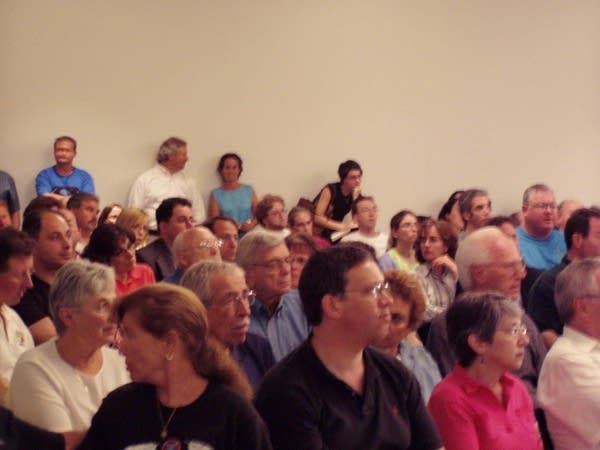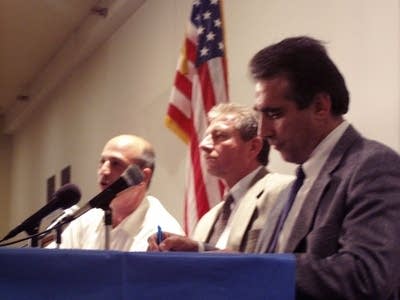Minnesotans worry about Middle East conflict
Go Deeper.
Create an account or log in to save stories.
Like this?
Thanks for liking this story! We have added it to a list of your favorite stories.

Several hundred Twin Cities area Jews crowded into a cultural center in St. Louis Park to listen to a panel of experts explain the current situation. Many of the attendees wanted to know if they should follow through with travel plans to Israel.
"Absolutely, support Israel," one speaker told them. "Wait a few months," was the answer from another.

In addition to answering such practical questions, the speakers drummed home the need for Jews to learn as much as possible about the conflict. Richard Fromstein of the Jewish Community Relations Council told the audience it needs to learn to advocate for Israel's cause.
"For the many of you who've been to Israel, you should appreciate, and communicate to friends, Jewish and non-Jewish, how close the enemies are, how small a country Israel is that in some places it's almost like they're across the street threatening us with rockets and missiles," he said.
Turn Up Your Support
MPR News helps you turn down the noise and build shared understanding. Turn up your support for this public resource and keep trusted journalism accessible to all.
The panelists also stressed what they described as Israel's restraint in the clash with Hezbollah. Avi Keter, a retired Israeli Brigadier General, explained how the Israeli military has tried to avoid civilian Lebanese casualties.
"For those of you who followed, there had never been an air attack on an area before we threw out leaflets telling the population please leave, in order not to get hurt," Keter said. "From a military perspective, it's very bad, because also the bad guys they are realizing what's happening. So it is taking very long. So unfortunately, if we want to do it in a human way, if you can use that term, we can take long, and we are not going to stop."
We worry about every innocent civilian, whether they are Christians or Muslims or Jews.
That message seemed persuasive to audience member Ruth Ilias of St. Louis Park. She said she's been worried about the safety of family in Israel. But the speakers' descriptions of Israel's actions and policies were inspiring to her.
"I was proud. I felt the humanity, the caring, the compassion for everybody, and a real will and hope that there will be peace that will come out for everybody," she said.
In spite of the way Israel's intentions were described at the forum, the Lebanese death toll has been much higher than the Israeli one. Recent reports estimate 300 Lebanese dead, compared to about 30 Israelis.
When asked whether the Israeli military response has been disproportionate to the conflict, Lebanese-American Jad Hark said, "Of course. Being a son of Lebanon, I'm going to look at it that way."
Hark lives in Brooklyn Park. He's a Christian, as are many Lebanese-Americans in Minnesota. And his political views are complicated. He sees Hezbollah as the cause of the current conflict. And his feelings about Israel are mixed.

"There's always two sides to the story," Hark said. "Israel -- they have the right to defend themselves and ask for their people back, but I think they went too far by bombing everywhere and bombing everybody, and the pictures we see in the news. I cannot put into words what the Lebanese people are going through because of the Israeli bombings."
Hark has a number of family members in Lebanon, including his parents, so he's especially concerned about the Israeli air strikes hitting civilians.
It's an aching worry to many Lebanese-Americans in the area, according to Father Sharbel Maroun. He's the pastor of St. Maron Church in Minneapolis, which serves the Lebanese community. He says many of his congregation members are praying for safety of relatives in Lebanon. Maroun is encouraging them to think about all parties involved.
"We're looking at the situation broader than religious (concerns)," Maroun said. "We're looking at the situation with Lebanon in mind, Lebanon as a Muslim and Christian nation. We don't condone what Hezbollah is doing in the country. But at the same time, we worry about every innocent civilian, whether they are Christians or Muslims or Jews, whatever their religion is."
Maroun said members of his church are planning to hold a peace march soon and will continue to pray for all sides in the meantime.





